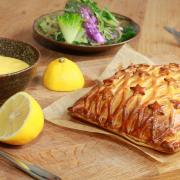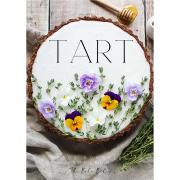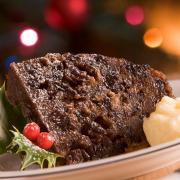Makes two loaves
Julie and David Peeks, of Artisan Foodworks, write: ‘We are asked on many occasions for gluten-free bread and there is a misunderstanding that spelt flour fulfils this requirement. Spelt flour is derived from ancient wheat that has not changed since Biblical times. It does contain gluten, albeit at a higher level than more modern varieties. Because the gluten in spelt is more soluble than wheat gluten, making yeast bread with spelt is different than making it with wheat as it is very easy to ‘over-knead’ spelt.
Making a 100% spelt loaf, such as a sourdough, is a challenging prospect as you are working with bread that has difficulty in holding together if over worked, so this recipe incorporates a proportion of strong white flour for consistency but without losing the ‘nutty’ flavour of the spelt flour.
RECIPE:
Overnight Sponge:
235g strong white flour
150g water
5g salt
2g dried yeast
Final Dough:
460g strong white flour
180g whole grain spelt flour
470g water
10g salt
6g yeast
125g honey
100g dried apricots chopped
Overnight sponge from above
METHOD:
The night before the bake, mix all the ingredients of the overnight sponge and leave either in the fridge or a cool place.
On the day of your bake, mix the water, honey and yeast, followed by the two types of flour and add the salt away from the yeast.
In a mixer, with a dough hook or by hand, knead the dough until it shows signs of becoming smooth on the surface and the gluten is forming.
Add the overnight sponge and knead the dough until the sponge is fully combined, gluten is formed and the dough has a smooth sheen.
Leave to prove for about one to 1½ hours or until the dough has increased to about double in size.
Remove the dough from the bowl and knock back to degas the dough.
Add the chopped dried apricots and work into the dough.
Leave the dough to relax on your bench for about ten minutes covered with a damp cloth.
After the dough has relaxed stretch the dough to twice as long as wide without tearing the dough.
Working from the top (furthest away from you) roll the dough over itself to about half way. Rotate the dough 180 degrees and repeat the rolling until you have one sausage shaped piece of dough. Tuck under the ends and place in a greased and floured 2lb loaf tin.
Leave to prove until the dough reaches the top of the tin. Slash the top of the loaf with a sharp knife.
Bake in a hot oven 230°C for 10 minutes followed by a further 30 minutes at 190°C.
Turn out the loaf onto a cooling rack and leave to cool before slicing. The bread also makes fantastic toast!
Artisan Foodworks is based in Burscough and hold breadmaking classes and open days. Their goods are now avaliable from Merlin’s Bakery Cafe in Burscough. For more information call David or Julie on 0845 860 2141



























